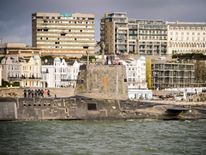While not all of the nuclear deterrent’s secrets should be revealed, there must be some transparency, says Sky’s Alistair Bunkall

In many ways, the most damaging element to the Trident story is the “cover up” itself.
Malfunctions happen, but the timing was unfortunate for Downing Street and so, it seems, they decided to bury the news of this failed test.
Trident missile tests in 2000, 2005, 2009 and 2012 were all publicised. In 2012 VIPs and even the Russians were invited along to witness it.
It wouldn’t be unthinkable for defence journalists, like myself, to be notified of a successful test.
While it is sensible that the whereabouts and operational details of a nation’s nuclear deterrent remain secret, there are rare times when it is worth showing off, or at least speaking publicly, about the capability.
This would have been one such occasion.
Another occasion was last year, when I was invited on board HMS Vigilant to meet the crew and learn about the workings of Britain’s four nuclear submarines.
This was purposely designed to get coverage of the deterrent ahead of the renewal vote.
It was part of a media strategy by the Government to be as open as it could about the deterrent, to allay fears some people might have and to explain an otherwise secret part of the British military.
The nuclear deterrent is a privilege. Britain is one of only five officially designated states to have a nuclear capability and that will continue long into this century after a successful Trident renewal vote.
But the deterrent requires trust. Whilst the general public cannot know everything about it – the location of the on-patrol submarine must remain highly classified for example – it is fair to expect that the blind faith demanded is repaid by a careful level of transparency.
Even MPs, whom the public put their trust in to make decisions on their behalf, were kept in the dark when they voted to renew the most destructive weapon on earth.
Would it have changed the outcome of the vote? Doubt it. Would it have made some MPs change their mind? Perhaps. Would it have allowed more educated and deeper debate? Certainly.
I have no reason to believe this malfunction was anything other than an error in technology.
In some ways there is something comforting in the knowledge that the Navy’s submariners safely managed the malfunction without consequence.
But as with any part of society that does its work in secret, rumours and conspiracy theories build up, encouraged by those who oppose it, and cover ups only make things worse.





No comments:
Post a Comment